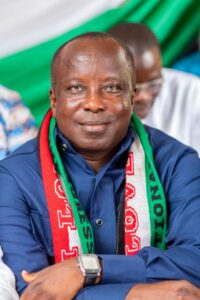Nana Baffour Owusu Bediako, the Paramount Chief of Domeabra, has implored political parties to refrain from interfering with operations of state institutions.
He said Ghana’s reputation as an island of peace and stability is threatened by a number of factors including frequent land disputes, unregulated mining operations, youth unemployment, the political elite’s desire to undermine state institutions, sensational media coverage and chieftaincy disputes among others.
It is unsurprising that Ghana’s ranking on the most recent Global Peace Index dropped from 40th to 51st, but it still holds the second spot in West Africa as the most peaceful.
According to him, the importance of peace in nation-building cannot be understated because without it, all of our efforts as a nation would be naught, stressing that peace is the only prerequisite for growth.

Speaking at the National Peace Council symposium, 2023 to mark International Peace Day in Kumasi, Nana Baffour Owusu Bediako stated that since the establishment of institutionalised peace-making entities, traditional leaders have acted as promoters and producers of peace.
He said with laws like the NPC Act 2011 (Act 818) that created the National Peace Council (NPC), Ghana continues to be one of the few nations in Africa with a well-developed national infrastructure for peace.
According to him, the NPC is required by law to facilitate and create methods for conflict prevention, management and resolution, as well as establishing a lasting peace in the nation.
This, he said, placed a heavy burden on every Ghanaian to contribute to the maintenance of peace and serve as its ambassador.
He noted that the goal of the celebration was to acknowledge the collective duty of people to promote peace, in the context of achieving the Sustainable Development Goals (SDGs), aim to strengthen the fundamentals of international peace for all nations and people and serve as a reminder of the value of peace and the potential fragility of our societies in the face of conflict and socio-political upheaval.
He stated that rethinking Ghana is still possible and would want to improve upon the peaceful and sustainable environment that our forefathers and predecessors left for us, as well as take care of it for the benefit of future generations.

The Paramount Chief of Domeabra stressed that conflicts do not only pose a threat to the region’s peace, but also to its socio-economic growth, as every project aimed at enhancing human security is impacted and explained that Armed conflicts frequently have a negative impact on economic activity, physical infrastructure and human capital.
He emphasised that the need for peace in the nation had never been more urgent than it was right now, when our socio-political structures did not appear to be able to handle new conflicts very well, as the lack of opportunities and the current economic challenges are making our youths more and more irate.
He said the country was becoming more and more disrespectful of cultural norms, customs and moral degeneration as impunity eats away the fundamental foundation of our society and the spectre of extremism hangs over the West African sub-region.
He reiterated that our progress has been hampered by the erosion of our traditional value system, unchecked social media usage by our youngsters and a pervasive desire among many people to become wealthy quickly.
Nana Baffour Owusu Bediako believes that the onus lied on friends, families, communities and traditional authorities to support the various security institutions to ensure our co-existence.
“It is also a moment for all institutions in a chain of peace building to execute their professional abilities in a more trusted manner”, he said, and advised that “We must continually work on establishing and preserving peace because recent national events have demonstrated how brittle it can be”.
He, however, cautioned that “we cannot take our current calm atmosphere for granted unless we make extra efforts to build peace”.
Meanwhile, Mr. Matthew Kojo Njourkone, the Ashanti Regional Director of Inter party and Civil Society Organisations (CSOs) has expressed concern over the Peace Council’s continued silence on the limited voter’s registration brouhaha.
According to him, the opposition National Democratic Congress (NDC) and other political parties in the country raised concerns over the Electoral Commission’s (EC) decision to limit the voter’s registration centers to their district offices, yet the response was negative.
The Director of Inter party and Civil Society Organisations stressed that considering political tension in the country before, during and after every electioneering period the EC’s continued rejection of every input and suggestion by political parties, except the governing New Patriotic Party (NPP), must be a source of worry to every stakeholder, especially the Peace Council.
According to him, the NDC and the other political parties are surprised about the conduct of the Peace Council since the EC decided to limit the voter’s registration centers solely to their district offices, which could disqualify potential voters who have turned 18 years and above.
Mr. Njourkone indicated that the EC halted the exercise for the past three years and that the possibility of existence of new voters would be high, hence limiting the exercise to their district offices would not help the young ones, as well as political parties and stakeholders.
He lamented that the Peace Council would have itself to blame in the event of anything untoward if it did not ensure peaceful co-existence among the citizenry.
He reminded the Peace Council of what happened during the 2020 general elections when about eight people were killed in Techiman South, which the President overlooked.
The Ashanti Regional Director of Inter party and Civil Society Organisations noted that the process to a peaceful election must begin with the Peace Council and the various stakeholders and institutions playing their roles effectively and he stressed that the time to act is now.








